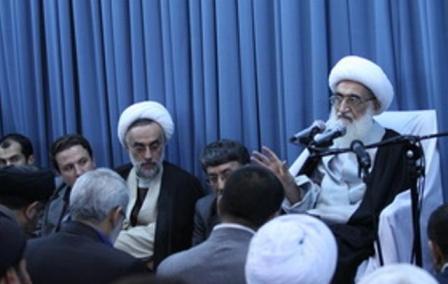Jurisprudent necessitates Islamic unity


A senior Iranian jurisprudent in Qom met with the university professors and highlighted unity and cooperation as the factor for glory of the nations.
Grand Ayatollah Hussein Noori Hamedani, Iranian Shia jurisprudent, in a meeting with professors of Payame Noor University and warned against disunity calling that a big shortcoming, reported Taqrib News Agency (TNA).
He referred to the importance of scientific researches and said,”The first principle for glory of the nations and Islamic communities is scientific development.”
He counted a Jihadi spirits as another principle for honor of the societies saying that the enemies are scared of such a society.
He stressed Muslim nations have boost their economic strength and quoted Islamic narrations that,” He who is dependent on others is a captive.”
“We have to try to protect Islamic Revolution and send that to the world as a reply to the demands of the world people.” He said.
This Iranian jurisprudent called 1979 Revolution of Iran as a religious and Islamic revolution and added,” One of the Islamic values is valuing Muslims because based on this teaching Muslims around the world have to honor the global and divine religion.”







